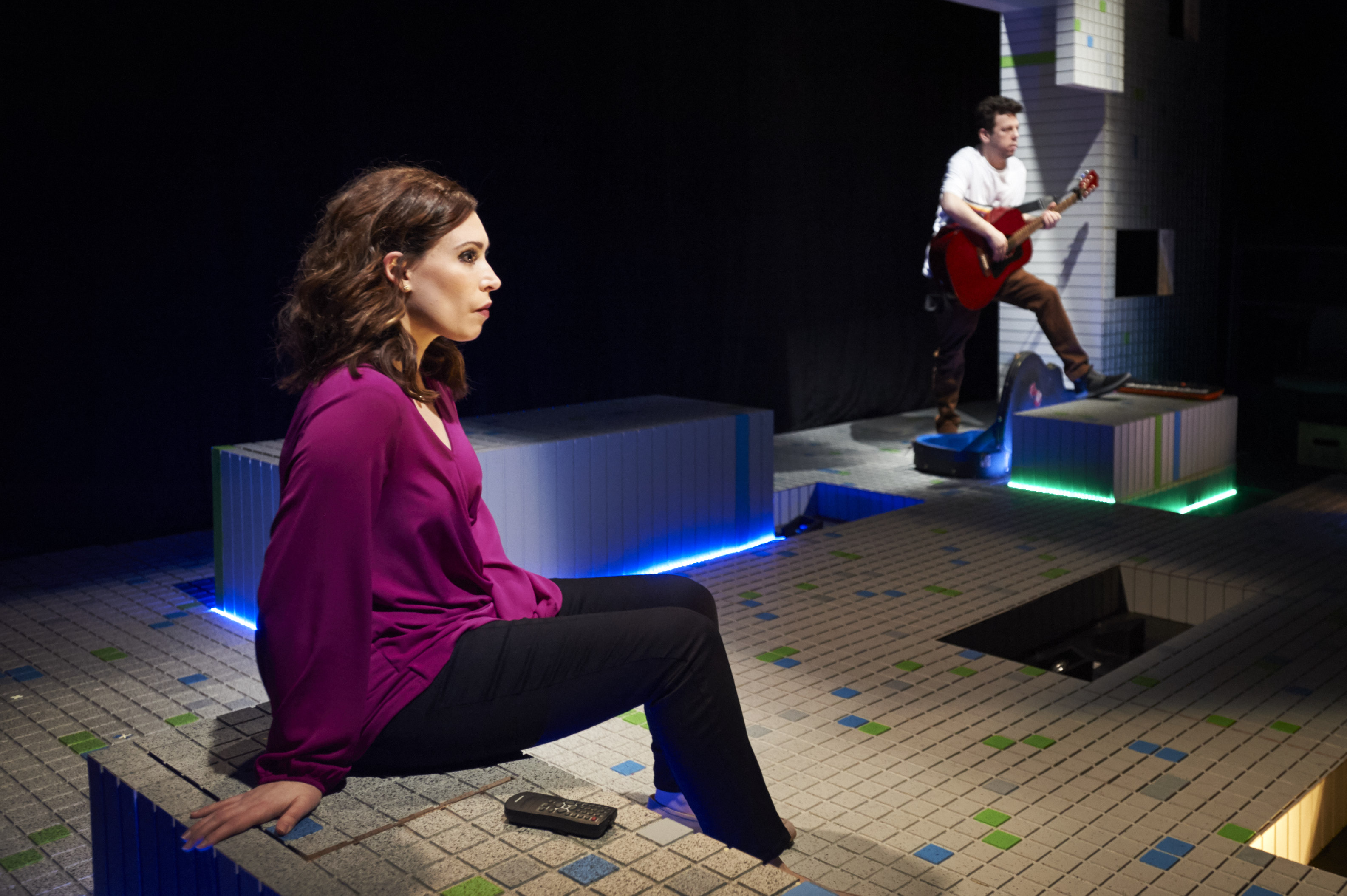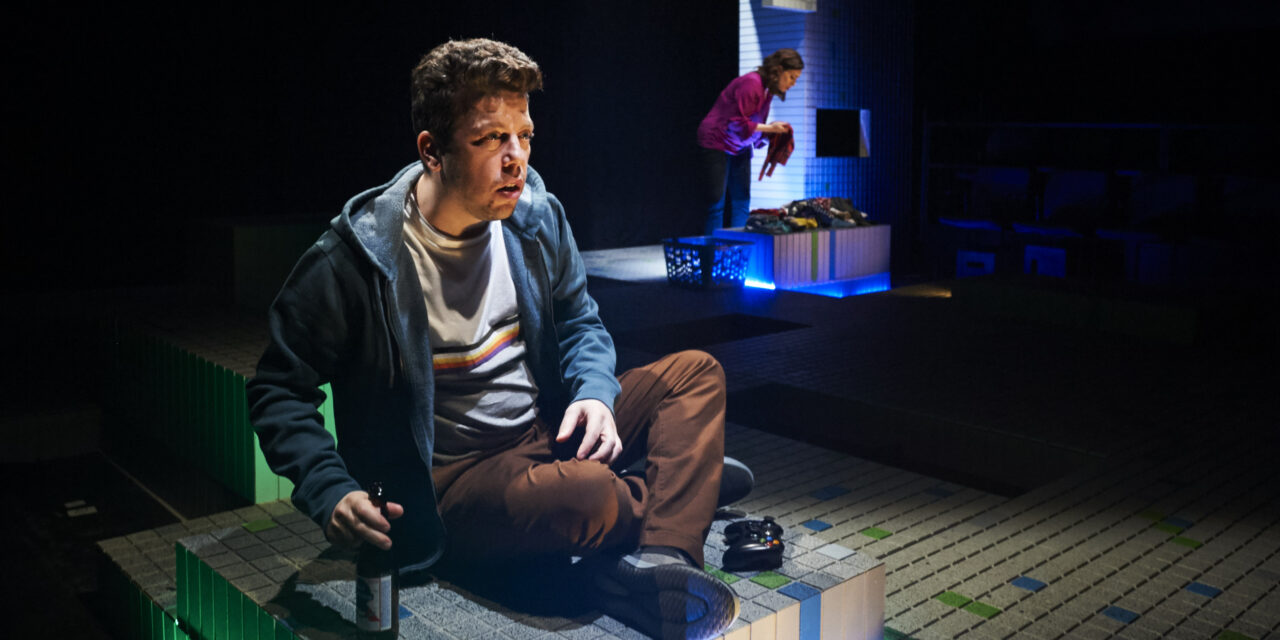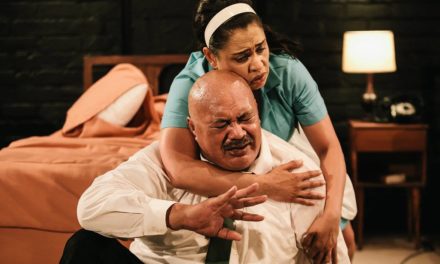Words, such tricky things! So vital to our survival as social creatures, yet so easily mis-fired or mis-taken, particularly when they are zinging back and forth between two phones, subjected to the evils of autocorrect and deprived of the saving grace of vocal inflection.
Matt Schatz’s new play The Burdens makes devilish comic hay out of such miscommunications. The play centers on Jane and Mordy Berman, adult siblings living on separate coasts – she in their hometown in Southern New Jersey, he in Los Angeles – who “talk,” like most Millenials, primarily through their thumbs. Older sibling Jane (Catherine LeFrere) is a put-together lawyer, married with three kids and a fourth on the way; Mordy (Ben Rosenblatt) is a wannabe musician, a man-child who slouches around in a dirty t-shirt and eats Lucky Charms out of the box (Madison Hack’s costuming here is rich with well-observed detail, down to his awkwardly mashed “bedhead” of hair). While Mordy’s doing his Peter Pan routine in California, Jane’s coping with the burden of dealing with aging relatives – specifically, their mean-spirited centenarian grandfather Zad Zad, whose care is draining their mother’s savings, and their mother herself, whose slide into poverty is a source of anxiety and dismay.
A slip of the thumb, a substitute of an “i” for an “o” and the word “dies” for “does,” and the pair suddenly find themselves joking – or are they? – about hastening Zad Zad’s inevitable demise. The plan, once hatched (well, sort of), brings them together in unexpected ways, until by play’s end, they are actually talking the old-fashioned way, IRL, with all of the nuance and sensitivity face-to-face communication enables.
Along the way, we see how the burdens of family history have shaped these two, along the lines of that old truism from the 2000-year-old man: “We mock the things we are to be!” We also see how IRL communication has never been a guarantee against misfires, either. The play’s title refers to one such misunderstanding: as kids, they used to go to a restaurant where the owner misheard their surname as “Burden,” and in response, Jane and Mordy had imagined into existence WASP-ish superhero alter-identities to go along with the mistaken moniker. Even the nickname Zad Zad is a linguistic mistake, a childish substitute for the Yiddish “Zaide.”
You may worry that a play in which nearly all of the communication is digital might involve too little emotion and engagement between the characters. Yet it’s the juxtaposition between the flatness of SMS communication and the richness of human experience beyond the screen that is both theme and comic drive behind the play, and the production captures that on several dimensions, including Britton Mauk’s set, which abstractly presents a world in which two dimensions are visually extended into three. Director Marc Masterson likewise gives his actors plenty to do to establish character and communicate with feeling even though they are ostensibly separated by thousands of miles and limited to 140 characters – they are for the most part unfettered by the realism of typing on a phone, free to engage in other activities (and use their voices and bodies to express what their messages don’t) as they send and receive communications. LeFrere and Rosenblatt are engaging and believable as siblings and their comic timing is spot-on; Rosenblatt also makes for a credible aspiring singer-songwriter, accompanying himself on guitar and electric keyboard as he croons a few of his character’s tunes.

L to R: Catherine LeFrere and Ben Rosenblatt. Photo by Kristi Jan Hoover, courtesy City Theatre.
Schatz’s dialogue is clever and zippy, and he deftly replicates the pitfalls and frustrations of modern digital communication; one of my favorite moments comes when Mordy’s congratulatory text to his sister on the news that she’s pregnant gets autocorrected to “Mazel gov!” (Been there.) Schatz also insightfully captures the way texting sometimes licenses people to communicate things they might not say in face-to-face conversation: at one point, Jane and Mordy get into a no-holds-barred argument over SMS that ought to be relationship ending. But the sibling relationship is resilient, and their shared past helps them move beyond such momentary cruelties. In the end, that’s also where the play leaves us – with the reminder that much as family burdens test and try us, with enough humor, generosity, and grace, we can carry them lightly.
This article was originally posted in The Pittsburgh Tatler on April 15, 2019, and has been reposted with permission.
This post was written by the author in their personal capacity.The opinions expressed in this article are the author’s own and do not reflect the view of The Theatre Times, their staff or collaborators.
This post was written by Wendy Arons.
The views expressed here belong to the author and do not necessarily reflect our views and opinions.


















